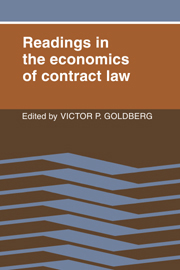Book contents
- Frontmatter
- Contents
- Preface
- Readings in the economics of contract law
- Part I Some preliminaries
- Part II Contract law and the least cost avoider
- Part III The expectation interest, the reliance interest, and consequential damages
- Part IV The lost-volume seller puzzle
- Part V Specific performance and the cost of completion
- Part VI Power, governance, and the penalty clause puzzle
- Part VII Standard forms and warranties
- Part VIII Duress, preexisting duty, and good faith modification
- Part IX Impossibility, related doctrines, and price adjustment
- Questions and notes on impossibility and price adjustment
- References
- Index of cases
- Author index
- Subject index
Part VI - Power, governance, and the penalty clause puzzle
Published online by Cambridge University Press: 10 November 2010
- Frontmatter
- Contents
- Preface
- Readings in the economics of contract law
- Part I Some preliminaries
- Part II Contract law and the least cost avoider
- Part III The expectation interest, the reliance interest, and consequential damages
- Part IV The lost-volume seller puzzle
- Part V Specific performance and the cost of completion
- Part VI Power, governance, and the penalty clause puzzle
- Part VII Standard forms and warranties
- Part VIII Duress, preexisting duty, and good faith modification
- Part IX Impossibility, related doctrines, and price adjustment
- Questions and notes on impossibility and price adjustment
- References
- Index of cases
- Author index
- Subject index
Summary
In a discrete transaction, the parties need not rely upon performance by a particular trading partner. For many exchange relationships, however, that is not the case. Having entered into a contract with a particular supplier, a buyer will find that the costs of leaving this contract and dealing with an alternative supplier are high. The buyer's dependence on continued dealing with this supplier gives the supplier power over the buyer in the sense that the seller can threaten to impose costs on the buyer unless it acted in a certain way.
The first two selections are concerned with some issues regarding power within the contractual relationship. While Klein [6.1] focuses primarily on franchise contracts and I [6.2] focus on the employment relationship, much of the analysis is relevant to a broader class of contracts. The crucial point is that the power is not necessarily bad; rational parties often want to set up their relationship so that one party will be able to exercise power over the other. At the same time, they often want to utilize some devices for governing the exercise of that power. This might entail reliance on reputation with the trade, public enforcement, explicit contract terms, establishment of a private dispute resolution apparatus, or some combination of these.
Klein's central point is that it will often be the case that the most efficient arrangement will entail apparently unfair contracts. One party will be able to impose a substantial penalty on the other.
- Type
- Chapter
- Information
- Readings in the Economics of Contract Law , pp. 137 - 138Publisher: Cambridge University PressPrint publication year: 1982



